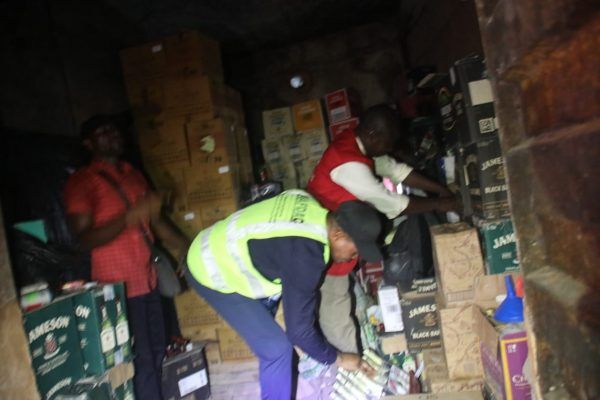… Seizes N180m Worth Of Drinks
The National Agency for Food and Drug Administration and Control (NAFDAC) has uncovered an illegal alcohol production factory in Oke Arin Market, Lagos Island, seizing counterfeit products worth over N180 million.
This was contained in a press statement issued on Tuesday on the Agency’s official X handle.
The statement reads, “NAFDAC has raided a makeshift factory in Oke Arin market, Lagos Island, following a complaint about the illegal production of alcoholic beverages.
“Three men were apprehended and various counterfeit alcoholic drinks, empty bottles, and packaging materials were seized,” the statement reads.
The agency urged the public to remain vigilant, particularly during the festive season when counterfeit goods are more likely to circulate. NAFDAC called on Nigerians to report any suspicious products or activities to the nearest office to ensure public safety.
READ ALSO:
“All suspects are currently in custody for further investigation. NAFDAC calls on the public to remain vigilant, especially during the festive season, and to report suspicious activities and products to the nearest NAFDAC office,” the agency said.
See more photos below.
Apart from the MPR hike, the liberalisation of the foreign exchange regime in June weakened the naira from N463.38/$ to N1,660.83/$ as of November 28, 2024. At the parallel market, the naira is being traded at around N1,750/$ as against 762/$ before the FX reform.
According to a report by Analysts Data Services and Resources, GDP growth in Q3’24 is further driven by the finance and insurance sector to 3.46 per cent.
“The sector has constantly remained the fastest growing sector in recent times,” it said.
The sector’s growth has had a ripple effect, creating jobs, improving financial inclusion, and increasing revenue for the government. However, experts caution that the long-term impact of sustained rate hikes on borrowing costs and economic growth should be monitored.
“The impressive numbers from the finance and insurance sectors reflect the country’s resilience, but policymakers must balance monetary tightening with support for other struggling sectors,” said Ifeoma Adedayo, a Lagos-based economist.















